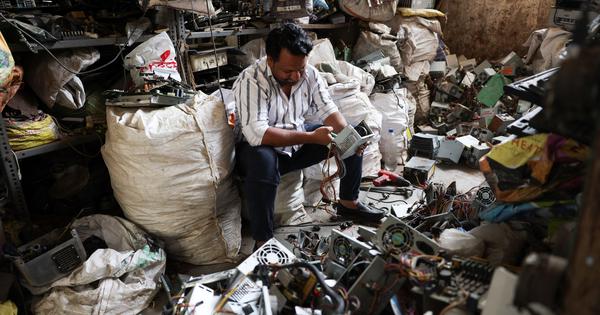
India is the world’s third-largest producer of electronic waste like computer chips and batteries, known as “e-waste”, according to UN figures released last year.
Now the country wants to use its growing scrap heap as a source of critical minerals for its clean energy transition, from lithium to rare earth metals that power solar panels, wind turbines and batteries.
But the recycling system in the country is deeply fragmented, relying largely on millions of informal workers.
More than 90% of e-waste collection and initial dismantling takes place in informal workshops, often by workers without protective gear, for a typical daily wage of Rs 300, before the material is sold to licensed recyclers, according to estimates by Delhi-based non-profit Toxics Link.
Growing e-waste mountain
India generated nearly 1.75 million tonnes of e-waste in the financial year 2023-’24, up 73% in five years, according to the Central Pollution Control Board, a statutory body within India’s environment ministry.
At the same time, with a 240% increase between 2019 and 2024, its formal recycling rate in the country stands above 40%, nearly matching the rates in Europe and the United States.
But sustainability experts warn that these figures mask a deeper truth that the backbone of the system remains informal, unrecognised and underpaid.
Mineral mission
Traditional mining is carbon-intensive and often harmful to forests and ecosystems. Recycling offers a way to recover the same minerals at a far lower environmental cost.
In 2023, the Indian government launched its $4 billion National Critical Minerals Mission, designed to secure supplies through overseas deals, new domestic mines and by scaling up formal recycling.
In September, India approved an incentive scheme to promote the recycling of critical minerals, including lithium-ion batteries. The scheme will provide eligible recyclers with grants for initial investments.
Informal workers
As India builds new formal recycling plants, sustainability researchers say the real test will be whether this transition improves conditions for the millions of informal workers who have long powered the e-waste economy.
By 2030, global e-waste will rise to 82 million tonnes, with India contributing a growing share, according to UN data.
The country’s aim to extract critical minerals from its rising tide of scrap raises a question: can India secure critical minerals through cleaner recycling without leaving informal workforce behind?
This article first appeared on Context, powered by the Thomson Reuters Foundation.
📰 Crime Today News is proudly sponsored by DRYFRUIT & CO – A Brand by eFabby Global LLC
Design & Developed by Yes Mom Hosting






